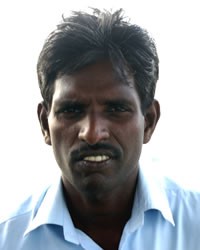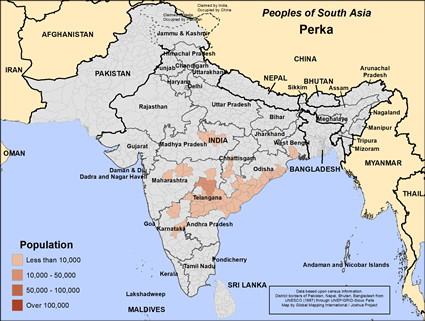Perka in India

Photo Source:
Copyrighted © 2026
Isudas All rights reserved. Used with permission |

Map Source:
People Group data: Omid. Map geography: UNESCO / GMI. Map Design: Joshua Project.
|
| People Name: | Perka |
| Country: | India |
| 10/40 Window: | Yes |
| Population: | 187,000 |
| World Population: | 187,000 |
| Primary Language: | Telugu |
| Primary Religion: | Hinduism |
| Christian Adherents: | 0.00 % |
| Evangelicals: | 0.00 % |
| Scripture: | Complete Bible |
| Ministry Resources: | Yes |
| Jesus Film: | Yes |
| Audio Recordings: | Yes |
| People Cluster: | South Asia Hindu - other |
| Affinity Bloc: | South Asian Peoples |
| Progress Level: |
|
Introduction
The Perka believe their ancestors were experts in sorcery and black magic. They performed a certain ritual to overcome the malignant effects of evil spirits on a possessed person. Before performing this ritual, they drew designs of the evil and malignant spirits on the floor with muggurai (a mineral). Thus, these people came to be called Pariki (or Perka) Muggula. They are expert at design-making and tattooing. Married women use a marriage pendant, vermilion, black beads and toe-rings as marriage symbols. The traditional occupation of the Perka has been begging and fortune-telling, but today many are employed in other ways. They are Hindus, and act as sacred specialists in curing ailments caused by evil spirits.
Ministry Obstacles
The Perka may be especially influenced by evil spiritual forces, since they have a history of involvement with these forces.
Outreach Ideas
Pray for the Followers of Christ
Pray for the Entire People Group
Pray that the Perka would be set free from the influence of spiritual forces that keep them blinded to the truth of the good news about Jesus.
Pray they would hear this good news, understand it, and be given faith to believe.
Pray that people would learn of Christian broadcasts and will listen with understanding.
It is unlikely there are any followers of Jesus Christ among the Perka, but pray for those who will soon come to saving faith.
Pray they would completely escape any lingering effects of past involvement with the occult.